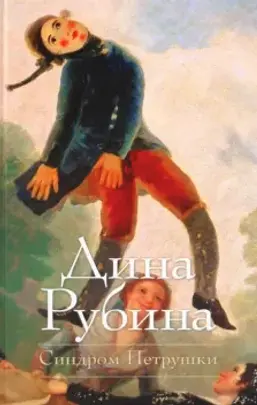The Petroushka Syndrome
Author
Over 400,000 copies sold
Full French translation available
Much like in Lawrence Durrell’s enduring classic, The Alexandria Quartet, Dina Rubina gives the stage to a diverse cast of voices as she tells the wrenching, enchanted, tragic, somewhat mystical, evocative, and ultimately happy love story of a poignantly flawed puppeteer touched by true genius, and his fragile wife, haunted by the ghosts of her family’s dark past. Part impassioned love drama, part evocative family story, part mystical Gothic novel about puppets and puppeteers, and part intellectual examination of history and art, The Petroushka Syndrome is a beautifully symbiotic novel about identity and the act of creation, longing, loss and, ultimately, love.
When an eight-year-old boy, Petya Uksusov, watches a fiery red-haired lady fall out a window (she falls just like a puppet!), he cannot imagine that this image will trigger the two biggest obsessions of his entire life: puppets and Liza. That same evening, a shut-down, autistic Petya starts playing with fellow kids’ puppets, demonstrating unique skills and almost supernatural powers for performance, literally breathing life into dolls. The next day, Petya notices a red-haired baby girl in a buggy at a grocery store, and, smitten by the baby’s beauty (she’s just like a doll!), decides he absolutely must kidnap the girl. When Liza is returned to her father, Petya discovers she is the daughter of the woman who committed suicide. Petya keeps the girl constant company from then on. When the girl reaches college age, they run away from her father, a lawyer with a repulsive personality and troublingly unhealthy sexual inclinations.
Over the years, Petya becomes an internationally renowned puppeteer who is much in demand; he marries Liza. Together the couple perform a provocative and arresting dance number that wins them vast acclaim. The death of their infant son from a rare and incurable genetic disorder known as the Petroushka Syndrome (male infants in Liza’s family have suffered from the syndrome for many generations; the symptoms include a high degree of mental disability, a constant smile on the face, and early death), drives both parents to the verge of despair: Petya, because his wife’s life is falling out of his control, and Liza, because she’s failing in the fight with the sinister ghosts of her family’s dark past. Liza suffers from a severe mental breakdown, ending up in an Israeli rehab center, under the care of Petya’s childhood friend. Liza’s rehabilitation is disrupted when she discovers that Petya is creating a new puppet, an exact copy of his wife, a true masterpiece of his genius as a puppeteer, and Ellis will now replace Liza in their famous dancing gig. As Liza frantically attempts to confront her Doppelganger, her husband’s artful creation, Petya is set to find the truth about their families’ past, the only truth that could save their marriage, career, and even their life.
Told through multiple narrators’ perspectives (Petya’s story intersects with that of Boris, Petya’s childhood friend and Liza’s doctor), this melodramatic story rises to philosophical and psychological levels to reach the depth and electricity of a true tragedy. Dina Rubina exquisitely renders settings of a Polish-Jewish Lviv, a desperately vast Sakhalin, a snowy Prague, and a torrid Jerusalem with rich detail and texture. This becomes the colorful backstage for the author’s compelling version of the Pygmalion myth with echoes of a sinister Golem.
Quote from Dina Rubina: I believe that a person is so multi-dimensional and so complex and excitingly simple, that a so-called author’s perspective just isn’t enough: the characters should mould images of one other, becoming one other’s puppeteers, demiurges, and gods… The reader is free to find their own hero and even their own story within these multiple worlds since the story, too, spins on a revolving stage, revealing new facets with each turn.
Book details
Eksmo
Novel, 2010
428 pp
Rights sold
French Macha Publishing (reverted)
Bulgarian LabyrinthSimplified Chinese Shandong Publishing House of Literature and Art
Lithuanian Nordina
Czech Omega/Dobrovsky
Turkish Alfa Kitap
Hungarian Europa
Film rights
Feature film directed by Elena Khazanova was released in Russia in 2015







